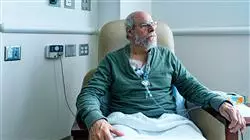University certificate
The world's largest faculty of psychology”
Introduction to the Program
Know and manage clinical assessments using appropriate instruments to design patient care planning”

When a person is diagnosed with cancer, they feel that their life is ending. In many cases, patients withdraw into themselves and avoid talking about their feelings. Therefore, to optimize the doctor-patient relationship, it is necessary for psychologists to carry out a series of interventions to improve communication with all parties. Therefore, a good psycho-oncologist is trained to read the verbal and non-verbal behavior of the patient, paying attention to all the reactions they manifest.
With this program, students will be trained in psychological practice, developing their empathy and compassion, which are essential elements to establish a healthy relationship between health personnel and patients. Likewise, the elements of therapeutic communication will be described in a theoretical and didactic way, as well as the attitudes and methods to make it effective.
On the other hand, the assessment of the cancer patient's needs is essential to provide a better treatment. In this sense, students will know and handle such assessment by means of the appropriate instruments, such as the SF-36 Health Questionnaire or the Emotional Distress Screening Questionnaire (DME).
Finally, they will have the opportunity to learn the necessary steps in psycho-oncological research; from the formulation of a question and literature review, to sample selection, data collection, or the identification of dependent, independent and extraneous variables, as well as the degree of reliability, validity and the most frequent mistakes made in psycho-oncological research.
Get involved in the development of different research projects to formulate new theories and techniques”
This Postgraduate diploma in Clinical Assessment in Psycho-Oncology contains the most complete and up-to-date educational program on the market Its most notable features are:
- Practical cases presented by experts in Psycho-Oncology
- The graphic, schematic, and practical contents with which they are created, provide scientific and practical information on the disciplines that are essential for professional practice
- Practical exercises where the self-assessment process can be carried out to improve learning
- Its special emphasis on innovative methodologies
- Theoretical lessons, questions to the expert, debate forums on controversial topics, and individual reflection assignments
- Content that is accessible from any fixed or portable device with an Internet connection
Develop a plan for systematic research into the relationships between behavior and cancer”
The program includes, in its teaching staff, professionals from the sector who bring to this program the experience of their work, in addition to recognized specialists from prestigious reference societies and universities.
Its multimedia content, developed with the latest educational technology, will allow professionals to learn in a contextual and situated learning environment, i.e., a simulated environment that will provide immersive education programmed to prepare in real situations.
The design of this program focuses on Problem-Based Learning, by means of which professionals must try to solve the different professional practice situations that are presented to them throughout the academic year. For this purpose, the student will be assisted by an innovative interactive video system created by renowned and experienced experts.
Assess family threats, needs and resources, applying the necessary family assessment tools"

Detects and solves problems in the patients' communication with their doctors thanks to this Postgraduate diploma"
Why study at TECH?
TECH is the world’s largest online university. With an impressive catalog of more than 14,000 university programs available in 11 languages, it is positioned as a leader in employability, with a 99% job placement rate. In addition, it relies on an enormous faculty of more than 6,000 professors of the highest international renown.

Study at the world's largest online university and guarantee your professional success. The future starts at TECH”
The world’s best online university according to FORBES
The prestigious Forbes magazine, specialized in business and finance, has highlighted TECH as “the world's best online university” This is what they have recently stated in an article in their digital edition in which they echo the success story of this institution, “thanks to the academic offer it provides, the selection of its teaching staff, and an innovative learning method aimed at educating the professionals of the future”
A revolutionary study method, a cutting-edge faculty and a practical focus: the key to TECH's success.
The most complete study plans on the university scene
TECH offers the most complete study plans on the university scene, with syllabuses that cover fundamental concepts and, at the same time, the main scientific advances in their specific scientific areas. In addition, these programs are continuously being updated to guarantee students the academic vanguard and the most in-demand professional skills. In this way, the university's qualifications provide its graduates with a significant advantage to propel their careers to success.
TECH offers the most comprehensive and intensive study plans on the current university scene.
A world-class teaching staff
TECH's teaching staff is made up of more than 6,000 professors with the highest international recognition. Professors, researchers and top executives of multinational companies, including Isaiah Covington, performance coach of the Boston Celtics; Magda Romanska, principal investigator at Harvard MetaLAB; Ignacio Wistumba, chairman of the department of translational molecular pathology at MD Anderson Cancer Center; and D.W. Pine, creative director of TIME magazine, among others.
Internationally renowned experts, specialized in different branches of Health, Technology, Communication and Business, form part of the TECH faculty.
A unique learning method
TECH is the first university to use Relearning in all its programs. It is the best online learning methodology, accredited with international teaching quality certifications, provided by prestigious educational agencies. In addition, this disruptive educational model is complemented with the “Case Method”, thereby setting up a unique online teaching strategy. Innovative teaching resources are also implemented, including detailed videos, infographics and interactive summaries.
TECH combines Relearning and the Case Method in all its university programs to guarantee excellent theoretical and practical learning, studying whenever and wherever you want.
The world's largest online university
TECH is the world’s largest online university. We are the largest educational institution, with the best and widest online educational catalog, one hundred percent online and covering the vast majority of areas of knowledge. We offer a large selection of our own degrees and accredited online undergraduate and postgraduate degrees. In total, more than 14,000 university degrees, in eleven different languages, make us the largest educational largest in the world.
TECH has the world's most extensive catalog of academic and official programs, available in more than 11 languages.
Google Premier Partner
The American technology giant has awarded TECH the Google Google Premier Partner badge. This award, which is only available to 3% of the world's companies, highlights the efficient, flexible and tailored experience that this university provides to students. The recognition as a Google Premier Partner not only accredits the maximum rigor, performance and investment in TECH's digital infrastructures, but also places this university as one of the world's leading technology companies.
Google has positioned TECH in the top 3% of the world's most important technology companies by awarding it its Google Premier Partner badge.
The official online university of the NBA
TECH is the official online university of the NBA. Thanks to our agreement with the biggest league in basketball, we offer our students exclusive university programs, as well as a wide variety of educational resources focused on the business of the league and other areas of the sports industry. Each program is made up of a uniquely designed syllabus and features exceptional guest hosts: professionals with a distinguished sports background who will offer their expertise on the most relevant topics.
TECH has been selected by the NBA, the world's top basketball league, as its official online university.
The top-rated university by its students
Students have positioned TECH as the world's top-rated university on the main review websites, with a highest rating of 4.9 out of 5, obtained from more than 1,000 reviews. These results consolidate TECH as the benchmark university institution at an international level, reflecting the excellence and positive impact of its educational model.” reflecting the excellence and positive impact of its educational model.”
TECH is the world’s top-rated university by its students.
Leaders in employability
TECH has managed to become the leading university in employability. 99% of its students obtain jobs in the academic field they have studied, within one year of completing any of the university's programs. A similar number achieve immediate career enhancement. All this thanks to a study methodology that bases its effectiveness on the acquisition of practical skills, which are absolutely necessary for professional development.
99% of TECH graduates find a job within a year of completing their studies.
Postgraduate Diploma in Clinical Assessment in Psycho-Oncology
Psycho-oncology focuses on the psychological well-being of cancer patients and their families. This discipline is increasingly relevant in the care of oncology patients and in the academic preparation of health professionals. Would you like to specialize in this emerging field? You have come to the right place. At TECH Global University you will find the most complete and up-to-date Postgraduate Diploma in Clinical Assessment in Psycho-Oncology in the educational field. Our program is focused on providing you with the necessary knowledge to provide comprehensive care to oncology patients, from a clinical and psychological perspective. The program has a 100% online modality of study and is composed of innovative teaching resources that will give a plus to your educational experience. The syllabus will allow you to explore from the latest advances in the field of Psycho-oncology, to the most complex aspects of this discipline.
Become an expert in Psycho-oncology
The comprehensive care of the oncology patient involves a clinical assessment that goes beyond the medical and physical aspects, and extends to the emotional, social and psychological aspects. Therefore, in this Postgraduate Diploma we focus on providing you with the necessary tools and techniques to assess and address the psychological needs of the cancer patient and their family. Our program employs state-of-the-art teaching resources, including theoretical and practical lessons, continuous support from experts and completely innovative study material. Here, you will have the opportunity to access the treatment of real cases in professional practice. In addition, the syllabus makes use of state-of-the-art graphic, audiovisual and interactive material, which you will have within reach of any device connected to the Internet. As you progress through the program, you will gain the necessary skills to provide comprehensive care to the oncology patient, from a clinical and psychological perspective.







